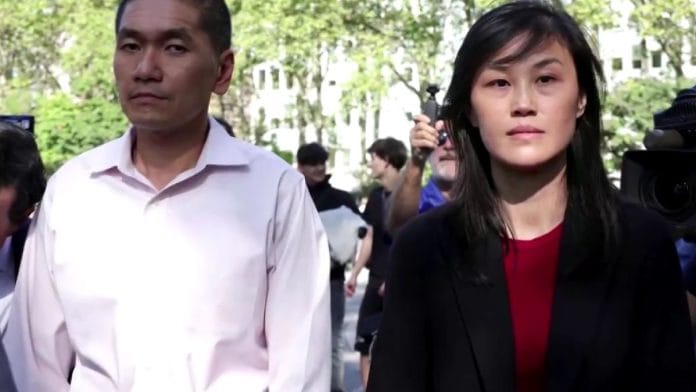Linda Sun, a China-born naturalised citizen of the United States, has been arrested on charges of spying for Beijing. A US indictment alleges that Sun, who served as deputy chief of staff to New York Governor Kathy Hochul and an aide to the state’s former Governor Andrew Cuomo, was covertly working for the People’s Republic of China and the Chinese Communist Party.
This case highlights the far-reaching and sophisticated operations of China’s United Front Work Department (UFWD) overseas. While espionage and influence tactics from China are not unprecedented—having been widely reported in Australia, the United Kingdom, and Canada—this arrest has sparked a debate in both the US and China, especially with the US presidential elections on the horizon.
Sun’s alleged activities include obstructing Taiwanese representatives’ access to the governor’s office, omitting references to Uyghurs and human rights violations in Xinjiang from official speeches, influencing messaging to favour China and CCP, and facilitating Chinese delegations’ trip to the US with fraudulent state invites. In return, Sun and her husband, Chris Hu, are said to have received millions of dollars and other favours from their handlers in Beijing.
‘Slander against China’
China’s official response has been characteristically subdued, dismissing the issue as the ‘US’ internal matter’. Mao Ning, spokesperson for the Chinese Ministry of Foreign Affairs, remarked: “I am not aware of the situation. I will not comment on the domestic cases in the United States, but we oppose malicious associations and slander against China.”
Meanwhile, Liu Pengyu, spokesperson for the Chinese embassy in Washington, rejected the charges as a smear campaign against China. “I am not aware of the specific details. But in recent years, the US government and media have frequently hyped up the so-called ‘Chinese agents’ narratives, many of which have later been proven untrue,” he said.
Chinese state media in English, such as Global Times and Xinhua, have not provided significant coverage of Sun’s arrest. Following US National Security Advisor Jake Sullivan’s recent visit to Beijing, China appears to have downplayed the issue to avoid disrupting ongoing discussions.
However, there is muted conversation on Chinese social media platforms. Many in the country view the charges as fabricated and manipulated, with some defending the alleged favours Sun received.
For example, a blogger argued that payment for Sun’s trip to Henan was standard international practice, comparing it to former US President Bill Clinton’s speaking fee in Shenzhen in 2002. The blogger questioned whether Clinton’s payment was fully disclosed, implying a double standard. Sun’s visits to and dealings with China were part of her responsibility to strengthen ties between Beijing and Washington, said the blogger.
State media in Mandarin has framed the issue as part of a broader US effort to malign China and disrupt bilateral relations. An article on the news website Guancha referred to the current period as “anti-China week” in the US, speculating that Congress might introduce new bills targeting Beijing. This, it said, might include measures to curb political influence and penalise American organisations accepting foreign donations.
Also read: China is keeping a close watch on Bangladesh. It’s an opportunity to counterbalance India
UFWD at work
China has a history of influencing outcomes in its favour in Western countries. It has often achieved this through student-led protests at Dalai Lama events on university campuses, or by deploying diplomats to hinder Taiwanese officials abroad. While China consistently dismisses US allegations of influence operations as “rooted in Cold War mentality”, UFWD operatives have managed to penetrate deep levels of government, including state and federal governments and agencies.
China’s united front strategy often focuses on engaging overseas Chinese communities through friendship associations and business groups. Sun herself was linked to several Chinese-funded organisations, including the All-China Federation of Returned Overseas Chinese.
The overseas Chinese have always been a central focus for UFWD, with President Xi Jinping himself underscoring their crucial role. The UFWD’s playbook clearly states that China’s unity at home hinges on rallying the “sons and daughters of China” living abroad. To win their support, United Front operatives use a mix of tactics.
According to the playbook, “fostering emotional bonds by emphasising ‘flesh and blood’ ties to the motherland and promoting a shared vision of China’s great rejuvenation” is crucial to the UFWD’s success.
However, the most commonly used tactic involves offering material incentives to overseas Chinese groups and individuals who support Beijing’s objectives. Sun’s case perfectly illustrates this approach, intertwining appeals to her Chinese heritage with monetary rewards for herself, her family, and her relatives back in China. Truly a serious problem for the US, especially when added to a growing list of similar cases.
As concrete solutions remain elusive, Chinese tactics continue to evolve, becoming more sophisticated and deeply entrenched. Sun’s ability to operate undetected for years goes beyond typical influence operations. It highlights the remarkable effectiveness of China’s strategies in shaping and influencing various aspects of US policy toward Beijing.
Sana Hashmi is fellow at the Taiwan-Asia Exchange Foundation and George H. W. Bush Foundation for US-China Relations. She tweets @sanahashmi1. Views are personal.
(Edited by Zoya Bhatti)






